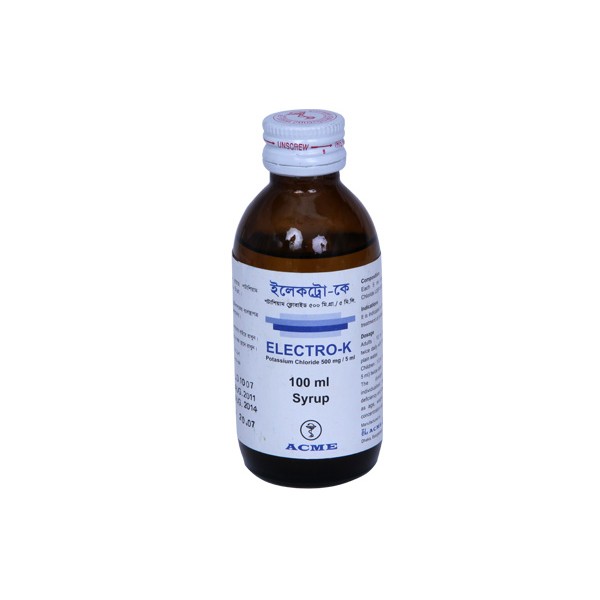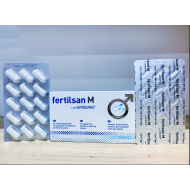
- Stock: In Stock
- Brand: Acme Laboratories Limited
- Product ID: Potassium Chloride
100% Secure Payment

Electro K 100 ml.
DESCRIPTION
ELECTRO-K (Potassium Chloride) is an electrolytic agent which is used as a
Potassium supplement. Potassium is the major intracellular cation which plays an important role in the biochemical integrity of cells. Potassium is accumulated by cells using an energy-dependent mechanism that pushes sodium out of the cell. Depending on the daily intake a healthy individual excretes Potassium about one third of his daily Potassium intake in the stool and two third in the urine. The normal daily intake of Potassium is about 2-3 g.
COMPOSITION
Tablet : Each tablet contains Potassium Chloride BP 600 mg equivalent to 8 mmol Potassium.
Syrup : Each 5 ml syrup contains Potassium Chloride USP 500 mg equivalent to 6.7 mmol Potassium.
INDICATIONS
ELECTRO-K is indicated in drug induced hypokalemia, liver cirrhosis, nausea,vomiting, cholera, diarrhoea, muscular weakness, paralysis, cardiac and congestive heart failure, diabetic ketoacidosis, ulcerative colitis, weakness, anorexia, drowsiness, Cushing's syndrome, pyloric stenosis, low blood pressure
etc.
DOSAGE AND ADMINISTRATION
Dosage must be adjusted to the individual needs of each patient.
Adults : In severe deficiencies 3-6 tablets or 4-8 teaspoonful or 25-50 mmol per day orally in divided doses for some days with fruit juice, sweet or plain water.
Children : ½-1 teaspoonful twice daily or 1-3 mmol/kg body weight a day in several divided doses.
Patient should take ELECTRO-K with meals.
OR AS DIRECTED BY THE PHYSICIAN.
SIDE EFFECTS
The most common side effects are nausea, vomiting, abdominal pain and diarrhoea.
CONTRAINDICATIONS
Potassium Chloride is contra-indicated to the patients who are hypersensitive to
Potassium salts. Potassium supplements are contraindicated in patients receiving Potassium sparing diuretics (e.g. Spironolactone, Triameterene) since such use may produce severe hyperkalemia.
PRECAUTIONS
The treatment of Potassium depletion, particularly in presence of cardiac disease, renal disease or acidosis, requires careful attention to acid-base balance and appropriate monitoring of serum electrolytes, ECG, and clinical status of patients.
DRUG INTERACTIONS
Concurrent use of Potassium and Potassium retaining diuretics is very likely to result in hyperkalemia. ACE inhibitors and Potassium have been reported to cause hyperkalemia during the therapy of heart failure. b-adrenoceptor blockers increase the risk of hyperkalemia when given with Potassium supplements.
SUPPLY
Tablet : Each box contains 10 X 10 tablets in strips.
Syrup : Each bottle contains 100 ml syrup.























%20Pvt.%20Ltd./Movicol-Oral-Powder-190x190.jpg)
